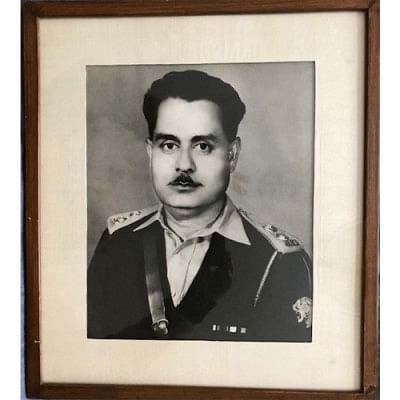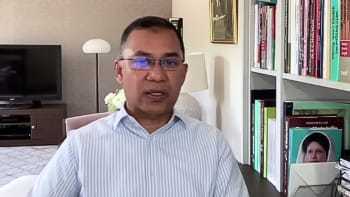My father laid down his life for our freedom. I couldn’t be prouder of him.

It is with a sense of pride and honour that I recollect the events of March 30, 1971 at Jashore Cantonment. My father, Lt Col. Syed Abdul Hai, was commissioned into the Army Medical Corps (AMC) in 1950. He was posted on deputation to the Ghana Army from 1965 to 1969. Being abroad cultivated his perspective that the emancipation and economic development of East Bengal was not well-served within the existing political construct of Pakistan. My father had no interest in participating in Ayub Khan's 1965 misadventure against India. When the Pakistan Army recalled him in September 1965, he managed to avoid going back. The Six-Point Programme launched under the leadership of Bangabandhu, combined with the Agartala initiative, resonated with my father's pro-Bengali thinking and beliefs.
Upon his return to Pakistan in 1969, he was appointed the commanding officer of 7 Field Ambulance in Jashore Cantonment, as part of the 107 Brigade. In the immediate aftermath of the devastating cyclone that struck on November 12, 1970, 7 Field Ambulance was extensively involved in relief and reconstruction work in Bhola. While there, his interactions with Tofail Ahmed of the Awami League directly exposed him to the fundamental political awakening that had taken root in East Bengal. The December 1970 general election results vindicated this realisation.
Following Bangabandhu's historic March 7 speech, my father decided to come to Dhaka from Jashore to reach out to Awami League for guidance. Between March 8 and March 12, he held separate meetings with Barrister Amir-ul Islam and Col. MAG Osmani, seeking guidance on what actions, if any, the Bengali elements of the army ought to take. These were monitored by the army's Inter-Services Intelligence.
My father returned to Jashore Cantonment accompanied by my mother Naseem Hai, my younger brothers Adel and Aref, and I on March 13. His decision to enter with both the Shonar Bangla and black flags flying on our car was reported to Brigadier Rahim Durrani, the commanding officer of 107 Brigade.
The Bengali soldiers and junior-commissioned officers (JCOs) of 7 Field Ambulance were very alert and sensitive to the ongoing political developments of the time. These sentiments found a sympathetic ear in my father, who by then had developed a special and direct relationship with them. Whenever they heard the adjacent units shout pro-Pakistani slogans, they retorted with "Joy Bangla!" Brigadier Rahim Durrani used to call my father and order him to control his troops. It was brave of my father to respond that the soldiers of his unit had the same right to express their feelings as the Pakistanis.
During this time, my father was desperately trying to liaise with Bengali officers in Jashore Cantonment with a view to forming a coordinated response to any direct action that the Pakistani army might take. The greatest obstacle he faced was the unwillingness of Lt. Col Rezaul Jalil, the Bengali commanding officer of 1 East Bengal Regiment, to contemplate any response. Leading up to March 25, Lt. Col Jalil was the senior-most Bengali army officer wielding direct command over combat troops in East Bengal.
My father did manage to arrange meetings with Captains Nuruzzaman and Abdul Wahab. Captain Hafizuddin Ahmed, Bir Bikram, of 1 East Bengal Regiment, was away and only returned to join his battalion at Chaugachha in the third week of March. My father knew him from the time they were involved in cyclone relief work in Bhola. Given that Captain Hafiz was away and closely surrounded by Pakistani officers of 1 East Bengal Regiment, my father could not directly contact him.
Early on the morning of March 30, Lt. Col Rezaul Jalil surrendered the keys of his armoury to Brigadier Rahim Durrani. Bengali soldiers broke open their armoury and started defending themselves against 25 Baluch. Captain Hafiz and Lt. Anwar Hossain provided leadership. As they evacuated the cantonment towards Chaugachha Bazar, Lt. Anwar, Bir Uttam, was hit with machine gun fire and embraced martyrdom.
Simultaneously, the Bengali soldiers of 7 Field Ambulance also started resisting by breaking open their armoury. My father encouraged his Bengali soldiers to join up with 1 East Bengal and escape from the cantonment. The Pakistani soldiers threw away their AMC epaulets' insignia, crossed over to the Pakistani lines, and informed them that the Bengali soldiers had joined up with those of 1 East Bengal, and that my father had encouraged them to do so.
My mother received a number of telephone calls from my father. My mother would later recount that in the last phone call my father had managed to make before the telephone connection was lost, he said, "The firing and shelling of my offices have intensified, and if anything were to happen to me, the children will be there for you." While my brothers and I have been there for my mother over the last 50 years, it is my mother who made countless sacrifices and remained steadfast in taking up new challenges to raise and educate us.
After midday, a group of soldiers of 22 Frontier Force approached the rear door of the room leading to my father's office. I understand that they were led by a certain Captain Mumtaz. I haven't been able to verify his identity. The group also included a Pakistani soldier of 7 Field Ambulance who could identify my father. They started knocking on the door and demanded that it be opened. With his adjutant Captain Sheikh to his left, my father approached the door and replied back that they were all unarmed doctors. As soon as Captain Sheikh opened the door, two men entered the room and, having identified my father, opened brush fire—first on my father and then on Captain Sheikh. Having shot them, the Pakistani soldiers did not proceed to kill anyone else. They left.
On March 31, Brigadier Durrani called and told my mother that my father had been killed in a crossfire. She said to the Pakistani officers present that she had a pistol and would shoot herself if she was not allowed to take my father's body back to Dhaka. Arrangements were made for us to take the body back to Dhaka on one of the flights bringing in Pakistani reinforcements. The Pakistan Army ordered us not to mourn publicly, and that the burial should be done in a quiet manner. On April 1, we buried our father in Azimpur graveyard under the surveillance of the army.
Two excerpts reproduced below establish the Pakistan Army's premeditated intent to kill any officer with pro-Bengali views.
The first is from the memoirs of Lt. Shamsher Mobin Chowdhury, Bir Bikram, of 8 East Bengal Regiment, who was wounded and captured at the famous Battle of Kalurghat Bridge: "An ambulance carried me to the Dacca CMH and I was admitted to the Officer's Ward after the Duty Doctor completed the necessary paperwork. I told him my name, Unit, and that I was an officer from 8 East Bengal and was wounded in Chittagong. Within seconds, the mood changed and the word was spread around the Ward that I was an enemy. At one stage, I overheard one of the Pakistani officers telling others how Lt. Col. S A Hai, a Bengali officer of the Army Medical Corps, was killed in Jashore on 30th March. I heard one of the officers going to great lengths to describe how Col. Hai in connivance with his wife was inciting Bengali officers in Jashore to revolt. They were caught and he was shot in cold blood."
The second excerpt is from "What Was Once East Pakistan" (OUP 2010), written by Syed Shahid Hussain, a Pakistani national. He was the Additional Deputy Commissioner of Khulna in March 1971 and was evacuated to Jashore Cantonment on March 29. He wrote: "That evening an army captain was recounting the day's (March 30) exploits. I was saddened to learn from him that they or perhaps he himself had killed our good Bengali doctor, an army colonel. I expressed my horror at the unwarranted murder of an innocent and well-meaning human being who had invariably shown great concern for us. This remark provoked the young captain to point his gun at me because he felt I was defending a traitor; for the Pakistani troops, every Bengali was a traitor."
A play based on the above events in Jashore Cantonment was produced and broadcast by Bangladesh Betar as part of the series "Pages from History" (Etihashar Prishtha Theke). Fifty years have elapsed, yet the memories and emotions of those days of March 1971 are still etched fresh and forever on my mind. These recollections are dedicated to those who, like my father, were killed by the Pakistani army in Jashore. Invoking the colossal sacrifice in times of war by a historic city, "let no one forget, let nothing be forgotten."
Ashfaque Hai is the son of Lt Col. Syed Abdul Hai, who was killed by the Pakistani army on March 30, 1971.

 For all latest news, follow The Daily Star's Google News channel.
For all latest news, follow The Daily Star's Google News channel. 



Comments